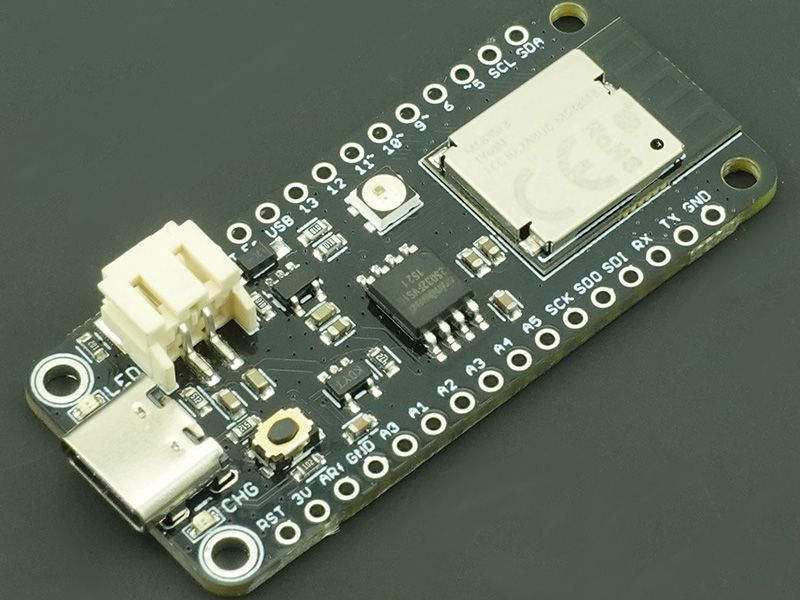
Challenger 840 BLE by Invector Labs
The Challenger 840 BLE board is an Arduino/Circuitpython compatible Adafruit Feather format micro controller board packed with loads of functionality for your projects that require low power consumption and a BLE connection.
The main controller of this board is the Nordic Semiconductor nRF52840 with 1MByte of FLASH memory and 256KByte of SRAM. The nRF52840 SoC is the most advanced member of the nRF52 Series. It meets the challenges of sophisticated applications that need protocol concurrency and a rich and varied set of peripherals and features. It offers generous memory availability for both Flash and RAM, which are prerequisites for such demanding applications.
The nRF52840 is fully multiprotocol capable with full protocol concurrency. It has protocol support for Bluetooth LE, Bluetooth mesh, Thread, Zigbee, 802.15.4, ANT and 2.4 GHz proprietary stacks.
In the recent years we have noticed that we are seeing more and more USB Type C cable laying around the lab due to the fact that all new phones and accessories use them. As of yet we haven’t seen any shortage of micro USB cables but we are not getting any new ones any more and old ones do break occasionally. So we decided to go for a USB Type C connector for this board. A bonus of this is that they are quite bit more durable and you don’t have to fiddle with the cable before plugging it in.
The board is packed with hardware features, here’s a short list of its most prominent ones.
– Sturdy USB Type C connector – nRF52840 @ 64MHz – 1MB FLASH + 256KB RAM – 2 MByte of NOR FLASH memory – 32.768 KHz crystal for clock generation & RTC – 3.3V regulator with 600mA peak current output, most of which is reserved for the board itself – USB native support, comes with UF2 USB bootloader – 20 GPIO pins – Hardware Serial, hardware I2C, hardware SPI support – PWM outputs on all pins – 6 x 12-bit analog inputs – Built in 250mA lipoly charger with charging status indicator LED – Pin #13 red LED for general purpose blinking – Power/enable pin – 4 mounting holes – Reset button – Neopixel LED that indicates board status but that can be used by the programmer
Purchase
Contribute
Have some info to add for this board? Edit the source for this page here.
CircuitPython 9.2.8
This is the latest stable release of CircuitPython that will work with the Challenger 840 BLE. Use this release if you are new to CircuitPython.
On nRF boards, CircuitPython 8.2.0 and later require UF2 bootloader version 0.6.1 or later. Older bootloaders cannot load the firmware. See Update UF2 Bootloader below.
Modules included in this download
_asyncio _bleio _pixelmap adafruit_bus_device adafruit_pixelbuf aesio alarm analogio array atexit audiobusio audiocore audiomixer audiomp3 audiopwmio binascii bitbangio bitmapfilter bitmaptools board builtins builtins.pow3 busdisplay busio busio.SPI busio.UART codeop collections countio digitalio displayio epaperdisplay errno fontio fourwire framebufferio getpass gifio i2cdisplaybus io jpegio json keypad keypad.KeyMatrix keypad.Keys keypad.ShiftRegisterKeys keypad_demux keypad_demux.DemuxKeyMatrix locale math memorymap microcontroller msgpack neopixel_write nvm onewireio os os.getenv paralleldisplaybus pulseio pwmio rainbowio random re rgbmatrix rotaryio rtc sdcardio select sharpdisplay storage struct supervisor synthio sys terminalio tilepalettemapper time touchio traceback ulab usb_cdc usb_hid usb_midi vectorio warnings watchdog zlibIncluded frozen(?) modules: adafruit_ble, challenger_840, neopixel
Features: Bluetooth/BTLE, USB-C, Breadboard-Friendly, Feather-Compatible, Battery Charging
CircuitPython 10.0.0-beta.0
This is the latest development release of CircuitPython that will work with the Challenger 840 BLE.
Alpha development releases are early releases. They are unfinished, are likely to have bugs, and the features they provide may change. Beta releases may have some bugs and unfinished features, but should be suitable for many uses. A Release Candidate (rc) release is considered done and will become the next stable release, assuming no further issues are found.
Please try alpha, beta, and rc releases if you are able. Your testing is invaluable: it helps us uncover and find issues quickly.
On nRF boards, CircuitPython 8.2.0 and later require UF2 bootloader version 0.6.1 or later. Older bootloaders cannot load the firmware. See Update UF2 Bootloader below.
Release Notes for 10.0.0-beta.0
Modules included in this download
_asyncio _bleio _bleio (native) _pixelmap adafruit_bus_device adafruit_pixelbuf aesio alarm analogio array atexit audiobusio audiocore audiomixer audiomp3 audiopwmio binascii bitbangio bitmapfilter bitmaptools board builtins builtins.pow3 busdisplay busio busio.SPI busio.UART codeop collections countio digitalio displayio epaperdisplay errno fontio fourwire framebufferio getpass gifio i2cdisplaybus io jpegio json keypad keypad.KeyMatrix keypad.Keys keypad.ShiftRegisterKeys keypad_demux keypad_demux.DemuxKeyMatrix locale lvfontio math memorymap microcontroller msgpack neopixel_write nvm onewireio os os.getenv paralleldisplaybus pulseio pwmio rainbowio random re rgbmatrix rotaryio rtc sdcardio select sharpdisplay storage struct supervisor synthio sys terminalio tilepalettemapper time touchio traceback ulab usb_cdc usb_hid usb_midi vectorio warnings watchdog zlibIncluded frozen(?) modules: adafruit_ble, challenger_840, neopixel
Features: Bluetooth/BTLE, USB-C, Breadboard-Friendly, Feather-Compatible, Battery Charging
Absolute Newest
Every time we commit new code to CircuitPython we automatically build binaries for each board and language. The binaries are stored on Amazon S3, organized by board, and then by language. These releases are even newer than the development release listed above. Try them if you want the absolute latest and are feeling daring or want to see if a problem has been fixed.
Previous Versions of CircuitPython
All previous releases of CircuitPython are available for download from Amazon S3 through the button below. For very old releases, look in the OLD/ folder for each board. Release notes for each release are available at GitHub button below.
Older releases are useful for testing if you something appears to be broken in a newer release but used to work, or if you have older code that depends on features only available in an older release. Otherwise we recommend using the latest stable release.
